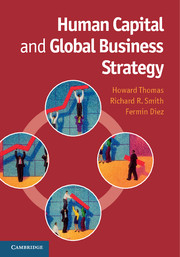8 - Conclusion
Published online by Cambridge University Press: 05 June 2014
Summary
We tend to look at people from the perspective of management instead of looking at management from the perspective of people.
Lale KesebiIntroduction
As we continue to evolve the idea of strategy as a core concept in management theory, we must find ways to more clearly incorporate human capital as a part of strategy. As we have argued throughout this book, human capital strategy and each of the elements are a core part of strategy implementation and essential to leadership processes in strategic change.
The dynamics of global business strategy include the external context, enterprise goals, and resources and capabilities. Strategic analysis is often centred on the external context as firms correctly review the competitive situation, global market shifts, and technology advances as globalisation evolves. More attention should be directed towards the internal resources and firm-level dynamic capabilities that create sustainable competitive advantage.
As we conclude this review of human capital strategy, we will demonstrate how firms can incorporate human capital strategy into their business strategy efforts and integrate the elements of human capital into strategy implementation.
- Type
- Chapter
- Information
- Human Capital and Global Business Strategy , pp. 240 - 250Publisher: Cambridge University PressPrint publication year: 2013



